Monitoring and Evaluation
Most M&E challenges, such as a lack of sufficient investment and capacities, are not specific to CVA. But those that are relate primarily to monitoring outcomes for unrestricted transfers. The flexibility of cash transfers can make it difficult to determine appropriate outcome indicators, as they may involve a combination of sector-specific and cross-cutting indicators. At the same time, there are limitations on gathering accurate data on how cash transfers are spent.
Grand Bargain signatories have committed to ensuring relevant M&E mechanisms are in place for cash, and increasing understanding of the costs, benefits, impacts and risks of cash relative to other modalities. Building on this, the GB cash workstream has action points including the development of common outcome indicators for multipurpose cash, and metrics for analysing value for money. Systematic value for money analysis has been limited by factors including a lack of agreed upon approaches, the need for quality outcome data, and the intensive nature of the analysis.
Current priorities
As part of the Grand Bargain cash commitments, the CALP Network has co-led (with USAID and CRS) the development of Multipurpose Cash Outcome Indicators. The draft for testing is currently available in English, French and Spanish via the library.
Related initiatives
Featured content

Multipurpose Cash Outcome Indicators – Final Draft for Testing
Guidelines and Tools
Note that the MPC indicators have now been revised. Please click here to access the updated Multipurpose Outcome Indicators and Guidance, which is available in Arabic, English, French and Spanish. Multipurpose Cash Outcome Indicators – Final Draft for Testing Multipurpose cash (MPC) is a type of assistance intended to enable people to meet their basic needs through local...

Monitoring 4 CTP: Monitoring Guidance for CTP in Emergencies
Guidelines and Tools
This guidance provides a central resource to promote a common understanding of the most important monitoring considerations for humanitarian projects using cash transfer programming (CTP). The primary audience for this guidance is field-level practitioners, from organisations directly involved in the design, implementation, monitoring, and accountability of projects using cash and vouchers...

Cost-Efficiency Analysis of Basic Needs Programs: Best Practice Guidance for Humanitarian Agencies
Guidelines and Tools
The Efficiency, Effectiveness and Value for Money Sub-Workstream is pleased to share the final output on Cost-Efficiency Analysis of Basic Needs Programs: Best Practice Guidance for Humanitarian Agencies (attached).
Cost-efficiency analysis estimates the ratio of program costs to outputs created, allowing you to compare cost-per-output for programs which all produced the same output. Such...
Thematic lead
Latest

COVID-19: A chance to empower citizens through social protection
Report
Billions of US$ are now being distributed to citizens by governments to stave off deteriorating economic impact and rising poverty from COVID-19. The unprecedented pandemic demands an unprecedented government response. More than 126 countries have already introduced or adapted social protection or labour...

CCD Ethiopia one-year in: Collaboration in reality
Report
Based on insights compiled from surveys and interviews conducted with members of the Ethiopian cash community and CCD (Collaborative Cash Delivery Network) members in January 2020, this report provides an overview of how CCD Ethiopia is working towards global and national objectives, takeaways for startup...

External Evaluation of SDC/HA Emergency Cash Pilot For Earthquake Affected Households in Bubq, Albania
Report
In November 2019, Albania was hit by a large earthquake with a magnitude of 6.4, causing 51 people to lose their lives and injuring 913 people. Around 47,000 additional people were directly affected by the earthquake. The Swiss Agency for Development and Cooperation (SDC) immediately deployed a rapid...
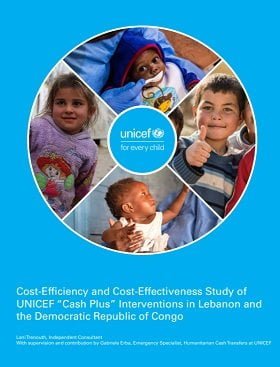
Cost-Efficiency and Cost-Effectiveness Study of UNICEF “Cash Plus” Interventions in Lebanon and the Democratic Republic of Congo.
Policy paper
The combination of basic services delivery and cash transfers is known among humanitarian practitioner as “cash plus”. This approach represents a solid comparative advantage for UNICEF considering its footprint in basic services delivery as well as its commitment to scale up humanitarian cash...

Somalia Cash Working Group (CWG) Monitoring Questionnaires
Guidelines and Tools
Baseline and Post-Distribution Monitoring questionnaires
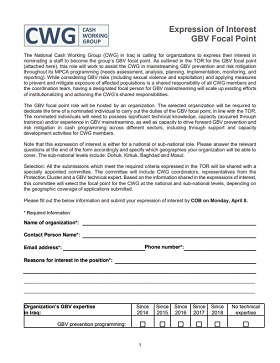
Expression of Interest GBV Focal Point
Policy paper
The National Cash Working Group (CWG) in Iraq is calling for organizations to express their interest in nominating a staff to become the group’s GBV focal point. As outlined in the TOR for the GBV focal point (attached here), this role will work to assist the CWG in mainstreaming GBV prevention and risk...
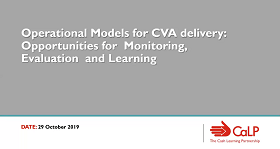
Monitoring, Evaluation and Learning: how to ensure efficiency, effectiveness and accountability
Blog Post
What are the key issues these and other emerging models are facing as they design to deliver better for people in crisis? What are the opportunities and challenges presented by working together differently?

Nigeria Capacity Gap Analysis
Case Study
Between 2009 and 2019, the Boko Haram insurgency has affected around 13.4 million people in North East of Nigeria. Out the total affected, around 7.1 million are in need of humanitarian assistance while 6.2 million are targeted for humanitarian assistance. To date, 1.8 million people are reported...

MEAL in Emerging Operational Models
Webinar

Multi-Purpose Cash Transfer ‘Plus’: Maximizing impact on children through integrated cash-based programming
Report
In 2018, with the support of OFDA and FFP, Save the Children implemented a multi-purpose cash transfer ‘Plus’ program in response to the influx of Venezuelan into Colombia. The program aimed at covering vulnerable household’s basic needs and prevent them from resorting to negative coping strategies,...

Cost-Efficiency Analysis of Basic Needs Programs: Best Practice Guidance for Humanitarian Agencies
Guidelines and Tools
The Efficiency, Effectiveness and Value for Money Sub-Workstream is pleased to share the final output on Cost-Efficiency Analysis of Basic Needs Programs: Best Practice Guidance for Humanitarian Agencies (attached).
Cost-efficiency analysis estimates the ratio of program costs to outputs created, allowing...

How Cash-Based Approaches affect Nutrition Outcomes: Case Studies from World Vision cash programmes in Bangladesh and South Sudan
Report
Case studies South Sudan & Bangladesh – analysis of how different modalities meet their basic needs with flexibility and dignity, esp. contributing to improved nutrition outcomes. Factors such as spending patterns, availability of nutritious food in markets, dietary changes & coping strategies, transfer...

How Cash-Based Approaches Affect Nutrition Outcomes – Guidence Note
Guidelines and Tools
Based on the case studies from South Sudan and Bangladesh, this summary guidance provides advise on use of CVA for improved nutrition outcomes in vulnerable children, emphasising recommendations to ensure that:
– as part of design and targeting, there is improved consideration of nutrition needs in MEB...

The UN Common Cash Platform: What does it mean and how is the IRC responding?
Blog Post
Together our members and partners have strengthened the evidence base and advanced the debate around gender and cash and voucher assistance. Looking ahead, how can we ensure we turn talk into action to deliver quality CVA for everyone?
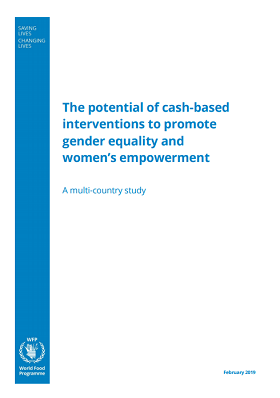
The Potential of Cash-Based Interventions to Promote Gender Equality and Women’s Empowerment
Report
The study on The Potential of Cash-Based Interventions to Promote Gender Equality and Women’s Empowerment sought to explore how CBIs can contribute to achieving gender equality and women’s empowerment (GEWE), as ends in themselves and for food security and nutrition outcomes. Where changes in GEWE...
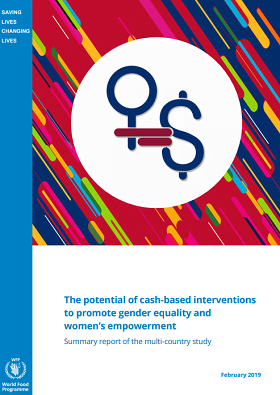
The Potential of Cash-Based Interventions to Promote Gender Equality and Women’s Empowerment – Summary Report of the Multi-Country Study
Report
The study on The Potential of Cash-Based Interventions to Promote Gender Equality and Women’s Empowerment sought to explore how CBIs can contribute to achieving gender equality and women’s empowerment (GEWE), as ends in themselves and for food security and nutrition outcomes. Where changes in GEWE...
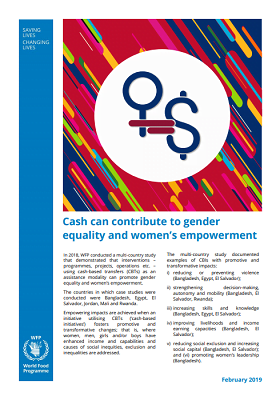
Cash Can Contribute to Gender Equality and Women’s Empowerment
Report
In 2018, WFP conducted a multi-country study that demonstrated that interventions – programmes, projects, operations etc. – using cash-based transfers (CBTs) as an assistance modality can promote gender equality and women’s empowerment. The countries in which case studies were conducted were...

Unblocked Cash Pilot Full Report
Report
This full report details the project scope, impact and learnings from the Unblocked Cash pilot in Vanuatu. The project was delivered in partnership with Oxfam Australia and ConsenSys, with funds from the Australian Government, and utilised a stablecoin, Dai, as the underlying value .
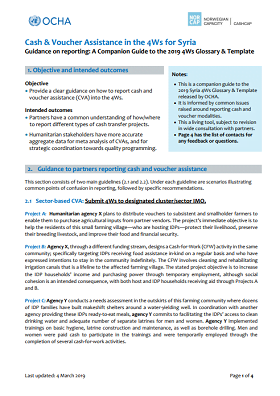
Cash & Voucher Assistance in the 4Ws for Syria Guidance on reporting: A Companion Guide to the 2019 4Ws Glossary & Template
Guidelines and Tools
Objective
• Provide a clear guidance on how to report cash and voucher assistance (CVA) into the 4Ws.
Intended outcomes
• Partners have a common understanding of how/where to report different types of cash transfer projects.
• Humanitarian stakeholders have more accurate aggregate data for meta...

Cash for Work (CFW) Guidance Note
Guidelines and Tools
Cash for Work interventions provide employment to unskilled and semi-skilled workers on labour intensive projects such as rehabilitation of irrigation systems, soil conservation, and road construction and maintenance.



